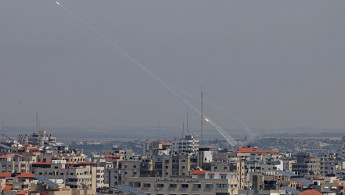The Palestinian resistance breaks its silence and bombs Israeli towns
Breaking its long-hours silence, the Palestinian resistance in the besieged coastal enclave attacked the Israeli cities adjacent to the Gaza Strip with barrages of rockets.
In a press statement sent to The New Arab, the Palestinian Islamic Jihad (PIJ) in Gaza said, "We attacked the Israeli-occupied cities as a response to the Israeli crimes against our people."
"We will not give up our right to force Israel to pay the price for its crimes," The PIJ added. "None of the Israeli cities will be safe from our attacks if the enemy continues its aggression against our people."
The Israeli army carried out an airstrike Tuesday which killed three of PIJ's leaders, who Israel claimed "threatened" its security. The attack by Israel, using 40 warplanes, killed mainly women and children.
Resistance groups in Gaza remained silent for more than 36 hours before launching a series of attacks on Israeli cities, which in turn enforced concerns and fears among the Palestinians in Gaza.
Mohammed al-Masri, a resident of Beit Lahia town in the north of Gaza, told TNA that neither he nor his eight-member family slept last night because they did not know if the armed group were going to attack Israeli cities.
"It was a strange situation for us as it was the first-ever time for the resistance to not respond to the Israeli assassination," the 43-year-old father of three said.
Mariam al-Haj Ali, a Gaza-based woman, expressed fears of a new military escalation with Israel, which means that more civilians will be killed by Israel.
"None of us wants war… but the absolute silence adopted by Hamas and Islamic Jihad put us under real pressure and fear," the 29-year-old mother of four added.
She hoped for the current tension between the Israeli occupation and the Palestinian resistance to end soon.
Meanwhile, Egyptian official sources, who preferred to not mention their names, told TNA that the Egyptian mediators were unable to maintain negotiations between the Palestinian resistance and the Israelis because the leaders of the PIJ have now turned off their phones after the attack by Israel.
"It seems that the armed Palestinians decided to change their strategies in responding to the Israeli violations by keeping their silence and putting the Israelis under psychological pressure for more time," the source added.
Hussam al-Dajani, a Gaza-based analyst, told TNA, "This silence puts Israel and the world in front of several scenarios that Gaza may adopt to respond to Israel, including that the response be strong and unified, which means that the Strip gets involved in a bloody war with Israel, and that depends mainly on the position Israeli at that time."
The second option, according to al-Dajani, "is for the factions, especially the Islamic Jihad, to respond in a limited way to the Israeli crimes by firing a few shells daily at the adjacent towns, while launching strong and intense bursts in the middle of the month coinciding with the march of the Israeli flags."
Al-Dajani further elaborated that the resistance may have actually change the way they respond to Israel by involving other fronts such as Lebanon, Yemen and some major countries such as Iran and Russia.





 Follow the Middle East's top stories in English at The New Arab on Google News
Follow the Middle East's top stories in English at The New Arab on Google News


